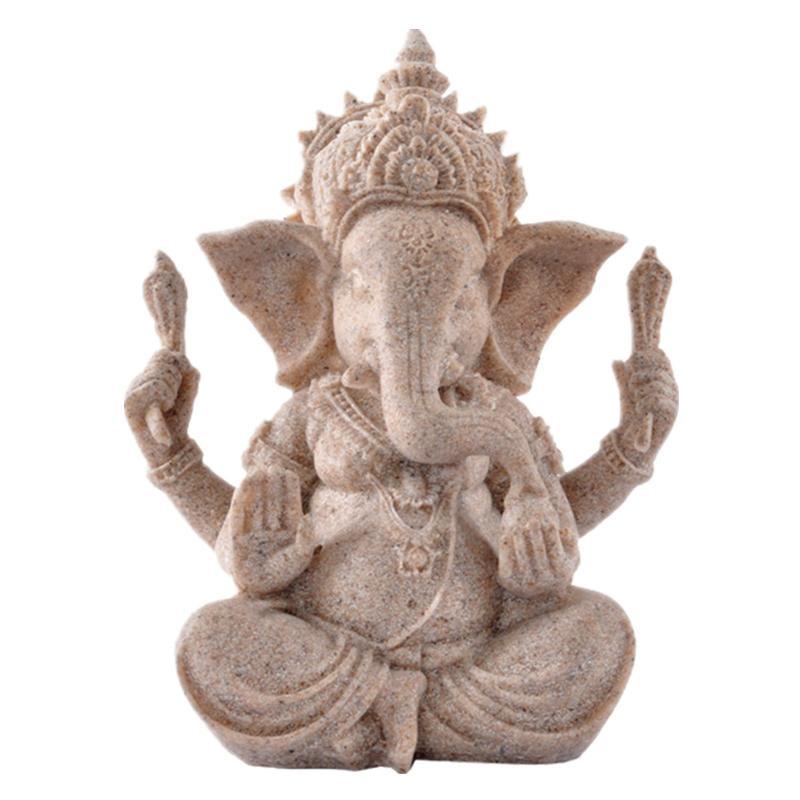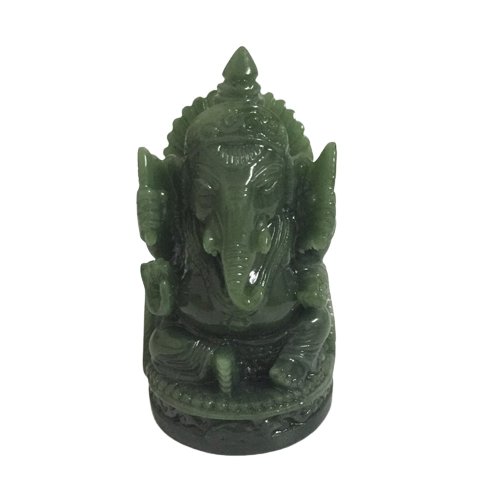The God Ganesh: his Meaning in Hindu Mythology
Hindu mythology is rich in stories and legends. Among the best known is the god Ganesh, who has unique meaning and symbolism in Indian culture.
This is not surprising: Ganesh represents not only a spiritual guide, but also a protective force for his followers.
In short, in this article, we will explore the meaning of the god Ganesh in Hindu mythology in order to understand the importance he can have in your life.
Contents :
1. Who is the god Ganesh in Hindu mythology?
2. The symbolism of Ganesh in the balance of the universe
3. The attributes of Ganesh (parashu, pasha, ankusha, mala, modaka)
4. Ganesh, god of intelligence
5. Ganesh, protector of the home
6. Ganesh, god of love and compassion

Who is the god Ganesh in Hindu mythology?
The god Ganesh is one of the most popular and revered gods in Hindu mythology. He is the son of Shiva, the supreme lord of the Hindu trinity (with Brahma and Vishnu).
Ganesh is depicted as an elephant-headed man wearing a headdress, with four arms which symbolize his divine powers. Its sturdy body can be covered in jewels or simply naked.
In some depictions, he rides a rat or a monkey, which symbolize his ability to overcome the material and spiritual obstacles that humans encounter in their daily lives.
In India, Ganesh enjoys great popularity as the "Lord of Beginnings". Indeed, Hindus generally pray to him for protection and success before any important undertaking, travel or business launch.
More broadly, Indians think of Ganesh that he can bring happiness to families and wealth to entrepreneurs... provided that we pay homage to him regularly.

The symbolism of Ganesh in the balance of the universe
Ganesh symbolizes strength, courage and wisdom, but he can also embody benevolence and protection against evil forces. For Hindus, its presence brings luck and good fortune during various ventures they undertake or at decisive moments in their lives.
Devotees believe that with his divine power, Ganesh can overcome any obstacle in your path to success.
Concretely, it is his central place in the cosmic balance that makes the god Ganesh such a powerful being. In fact, it is at the perfect point of balance between Shiva (consciousness) and Shakti (energy).
The attributes of Ganesh
Ganesh has five main attributes which symbolize his power:
- The parashu (an axe)
- The pasha (a noose)
- The ankusha (an elephant needle)
- The mala (a necklace)
- Modaka (sweets)
Each of these attributes carries a deep spiritual message for followers of Hinduism. The most important still remains the para.
The parashu is an ax that defends the allies of the elephant god against obstacles on their path to spiritual, physical or material success. It reminds us that we must be willing to sacrifice our earthly passions if they hinder our spiritual progress.
The pasha, for its part, symbolizes control over our impure thoughts so that we can achieve divine enlightenment by eliminating our fears and inner suffering.

Ganesh, god of intelligence
Ganesh is one of the most popular gods in the Hindu pantheon. Among its many attributes, it represents intelligence, wisdom and luck.
The cult of Ganesh dates back to Indian Antiquity; it is found in sacred Vedic texts dating from 1500 BC. In these writings, Ganesh is associated with the Brahmanical concept which defines intelligence as a divine force that can be invoked by those who seek knowledge and spiritual understanding.
Even today, many people call on Ganesh to obtain intellectual guidance and assistance in certain circumstances: important school or professional exams, crucial decision-making, etc.

Ganesh, protector of the home
Typically, devotees honor his image on altars in their homes so that the god Ganesh grants them protection from evil spirits and good fortune in their material or spiritual affairs.
This god is also known for his ability to remove obstacles and protect homes. Although Ganesh is known to be a protective deity of homes, his powers extend far beyond simple guardianship.
As a deity in the Hindu pantheon, Ganesh is considered to bring happiness, prosperity and protection against physical and spiritual evils.
Gurus of all sects in India also say that he rules luck and material success.
The faithful can therefore also honor the god Ganesh in order to bless their home, to bring success and to ensure that they never lack anything.
Ganesh, god of love and compassion
In addition to his qualities as protector of the home and friend of intellectuals, Ganesh is also considered the god of love and compassion, as well as the protector of travelers and artists.
Because he also embodies the divine will that accompanies each individual on their path to their ultimate spiritual destiny, he embodies love.
Indeed, for practitioners of Hinduism, love is the force that governs the world, brings it balance and meaning. Ganesh, the bearer of divine will, is therefore necessarily a bearer of benevolence.
In short, followers of Hindu cults worship the god Ganesh for these positive attributes: unconditional love, infinite forgiveness and a perfect understanding of what is happening in our hearts.
They frequently invoke the name of Ganesh in order to obtain his help against various obstacles that may arise when they are looking for a soul mate or, on the contrary, when their relationship is on the rocks.

Ganesh, god of family
Ganesh is also the god of the family and the (strong) ties that unite its members.
As the family god, Ganesh is honored before any important event, as he brings joy and happiness to the members of the household. Whether it's a wedding, funeral or birth, he'll never be far away.
Indians therefore pray to Ganesh in order to bring calm and balance to family relationships, dissipate tensions and guide us towards the resolution of conflicts.
Again in this context of Indian god of the family, believers celebrate Ganesh every year during the festival of “Ganesh Chahutai”, to celebrate his divine birth.
In certain regions of India, colorful processions are even organized to honor his arrival on Earth as well as the benefits and miracles he has granted to humans for thousands of years.

Ganesh statues: a good luck charm?
Ganesh is a very popular Hindu god and well known for his unique appearance. He has the head of an elephant, but the body of a man.
Besides their aesthetic appearance, statues of the god Ganesh are popular in India and across the world for their spiritual powers. In fact, they are often considered as lucky charms, as symbols of luck.
Go to India and you'll see for yourself: Ganesh statues can be found everywhere, from temples and general stores to official buildings and homes.
These sculptures symbolize many different things for the people who worship them: good fortune, prosperity, success and protection against obstacles.
In reality, all the qualities and attributes of the god Ganesh that we have cited in this article can be linked to them.
Lucky charm featured in this article

Sandstone Statue of the God Ganesh
See more
Sacred Statuette of the God Ganesh
See more


